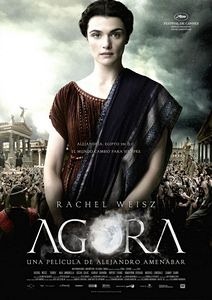 Agora (2010) – on rental. One of the films I was really looking forward to catching this year has been Agora. The film stars Rachel Weisz, and she plays Hypatia, a Greek scholar and teacher of mathematics and philosophy who lived around the 4th century and during the rising tide of Christianity in Roman-occupied Egypt.
Agora (2010) – on rental. One of the films I was really looking forward to catching this year has been Agora. The film stars Rachel Weisz, and she plays Hypatia, a Greek scholar and teacher of mathematics and philosophy who lived around the 4th century and during the rising tide of Christianity in Roman-occupied Egypt.
The film wasn’t easy to watch, possibly the more so for those of us who might have forgotten that our own Christian faith has had terrifically embarrassing moments in the last 2000 years, and I’m not referring to the recent news of priests and young boys. The most well-known incidents and periods that reveal the violence that religious zealotry can cause include the Crusades and the Salem Witch Hunts, so it’s refreshing to see a modern production relating the far lesser-known story of Hypatia.
Historically, Hypatia was unfairly blamed as the cause of tensions between the ruling Roman officials and the Alexandria Pope, and was brutally murdered by a Christian mob. I can’t recall if the film actually reached the cinemas here when I first blogged about my interest in the film in February this year. Either way, I picked it up on rental and gave it a go in the middle of the week.
There’s a theme in Agora that really resonated within me. It’s not the overt dangers of men twisting faith for their own purposes and its modern parallels coming out of militant Islam today. Instead, it’s how the paths of the students we teach as teachers might become intricately entwined with ours. The early scenes of the film establishes the kind of teacher Hypatia was: she encourages her students to question that which doesn’t make sense, resolves with a deft hand religious disputes between her own students, and demonstrates kindness to those who serve her in her father’s household.
Her students include the wealthy and politically powerful, two of whom would later cross paths with her again and significantly change her fate. One is Orestes who becomes the provincial governor of Alexandria, and tries very hard to protect her against the growing assertiveness of the Christian faction in the city; and the other is Synesius, who becomes the Bishop of Ptolemais, an ancient city of what is today Libya.
From a technical standpoint, the film is visually splendid. While its budget of USD75 million is just about half of what Hollywood blockbusters routinely cost these days, you won’t see short cuts taken anywhere on screen. Computer generated imagery is used sparingly and – from what I’m guessing – to enhance the backdrops to recreate 4th century Egypt, a period of history that’s rarely seen in films today.
Weisz turns in a marvelous performance of Hypatia too, but perhaps portrays her too sympathetically and without flaw. What’s known from the historical records are that she was a teacher of mathematics and philosophy, and who some of her better-known students were. But I wonder if some parts of her characterization has been buffed up to turn her into a martyr for truth, even if she’s eventually killed by the Christian mob not for this reason. Veteran but aging French actor Michael Lonsdale is also instantly recognizable and he plays Theon, Hypatia’s kindly father but who finds it difficult to understand the new Christian movement and its intrusion into the old beliefs.
I thought too there was some degree of showmanship on the part of the film. There are a couple of scenes that seem to come right out from Contact – sweeping zooms of the Musaeum of Alexandria and the city from space. And the film isn’t just portraying an unsympathetic period of Christian history. The other religions common of that time are equally portrayed in broad strokes that would have you believe that everyone in ancient Alexandria who was religious – the Jews, the Pagans and the Christians – were all idiots and that only the intellectuals and the teachers had any sort of sense.
Still, I like the film for Weisz’s mesmerizing performance of the philosopher, and how the city of ancient Alexandria – long gone today – really comes to life in a way that reminds me of what Richard Lester did for 17th century Paris in that old pair of Musketeer films from 35 years ago. The film isn’t dumb either. For those of us who are fascinated with early mathematics and how the ancient philosophers were trying to figure out ellipses, foci and what not (I’ve long returned all my math knowledge to my teachers!), the segments when Hypatia is trying to make sense of those complex concepts might be thrilling and alone worth the rental.:)





Recent comments